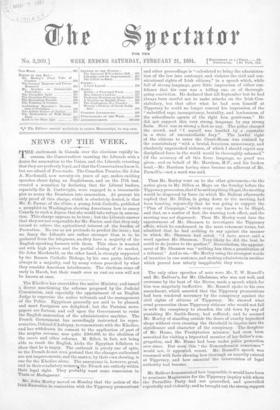Then Mr. Morley went on to the other grievances,—to the
notice given to Mr. Dillon at Mayo on the Sunday before the Tipperary procession, that if he said anything illegal, the meeting would be dispersed by force (to which Mr. Balfour afterwards replied that Mr. Dillon, in going down to the meeting, had been boasting repeatedly that he was going to support the "Plan of Campaign," which every one knows to he illegal, and that, as a matter of fact, the warning took effect, and the meeting was not dispersed). Then Mr. Morley went into the appointment of Mr. Shannon to investigate the Tipperary affair, which he condemned in the most vehement terms, but admitted that he had nothing to say against the manner in which Mr. Shannon had acted. "I have never said a word against Mr. Shannon. Very likely he did the best he could to do justice to the parties." Nevertheless, the appoint- ment of Mr. Shannon was "nothing less then a prostitution of a tribunal." And so on,—Mr. Morley using the strongest words of invective in one sentence, and making admissions in another which proved how utterly inapplicable they were.


































